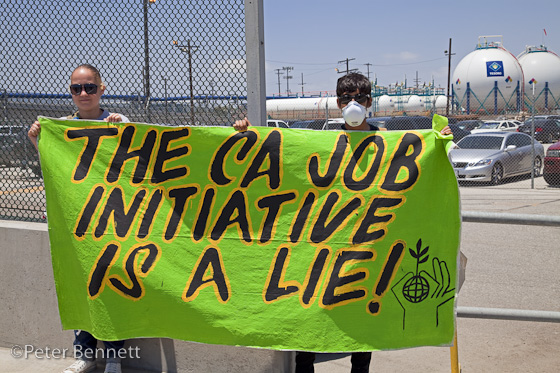
Chairman Bryan Shaw, Ph.D.

Commissioner Buddy Garcia
In a completely un-shocking and saddening display of administrative arrogance, the Texas Commission on Environmental Quality (TCEQ) commissioners Bryan Shaw and Buddy Garcia granted an air permit for the proposed Las Brisas coal plant. Commissioner Carlos Rubinstein abstained from voting due to being briefed on the permit when he previously served as deputy executive director.
The two commissioners who voted to approve the permit did so despite the fact that this permit has been recommended against twice by the State Office of Administrative Hearings (SOAH) judges who presided over the contested case hearing and deliberated for months on the specifics.
Again today at the TCEQ hearing both judges recommended against issuance of the permit, and the TCEQ’s own Office of Public Interest Council also recommended denial of the permit.
In addition there were lawyers speaking for the thousands of members of the Clean Economy Coalition (based in Corpus Christi where the Las Brisas plant is proposed), Sierra Club, and EDF, all of whom are against issuance of this permit. But after only 45 minutes of testimony during the public hearing, TCEQ Chairman Bryan Shaw recommended granting the permit application stating that he didn’t believe the merits of the facts before the commission would require or warrant (the state agency to remand it), based on his understanding of the rules in place.
[youtube=http://www.youtube.com/watch?v=dxM-LmeAuJM]
Earlier this week, the EPA had asked the Texas commission to not issue the permit until the two agencies could work together to resolve various issues, stating that they were concerned about a lack of consultation with them and that the plant could violate federal clean air standards. They further wrote that they had “strong concerns about the public health and environmental impacts” the plant would pose.
Commissioner Shaw said the EPA’s letter could not be considered because it was not part of the official record of Wednesday’s proceeding so it had no impact on their decision.
This permit is illegal, and the TCEQ commissioners have broken both federal (Clean Air Act) law as well as Texas law in granting it. The EPA also now requires greenhouse gas permitting for any new facilities permitted after January 1, 2011 – but the TCEQ commissioners wouldn’t consider any comments regarding this important factor. Still, Las Brisas will need to acquire such a permit from the EPA before they can begin construction, much less operation, of their proposed coal plant.
The facts in this case are clear. The permit does not meet the minimum standards necessary to protect human health and the environment, and the people who have actually investigated the particulars of this case have consistently and continually recommended against this permit.
Nevertheless, those who have the power to make the decision (the TCEQ commissioners) continue, as they have in the other coal plant cases, to ignore the concerns of the public, the medical communities, environmental groups, and even their own staff. Instead they make these permitting decisions based on politics and act as a rubber stamp for pollution.
TCEQ is up for “sunset” review at the Texas legislature this year. When asked at the Texas Sunset Advisory Commission hearing if the TCEQ had the authority to deny a permit, they answered yes, but given the history of new coal plant permits approved over the past decade, one would be hard pressed to determine what, if any, criteria would cause the state agency to exercise their authority.
In the months leading up to this decision, citizens from around the state have been letting the Sunset Commission know that they believed the TCEQ was broken, and they believe the agency that is supposed to protect our health and environment does the opposite.
The CEC and other people closely affected by this plant are outraged at this decision, but the whole state of Texas needs to be.
Although Las Brisas is the worst of the most recent coal plant permits to be issued by TCEQ there have been other, deficient coal plant permits granted within the last few months throughout Texas near Bay City, Sweetwater, and Victoria.
Please call your Texas legislator and ask them to ensure that TCEQ Commissioners will have to follow the decisions of the administrative judges who rule on these cases, instead of simply ignoring their concerns and the concerns of the public.
###
By promoting cleaner energy, cleaner government, and cleaner air for all Texans, we hope to provide for a healthy place to live and prosper. We arePublic Citizen Texas.
Read Full Post »












